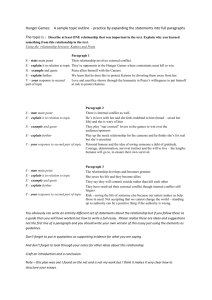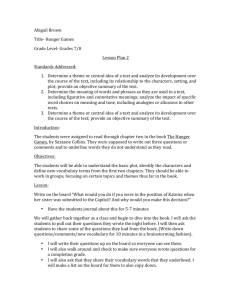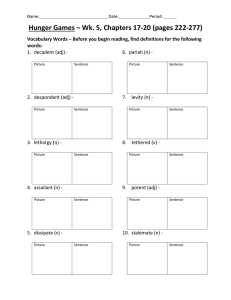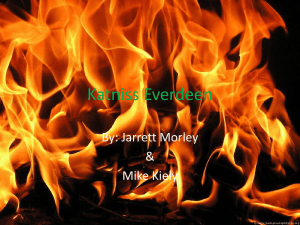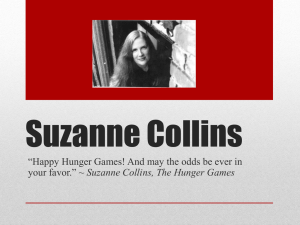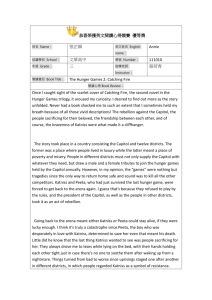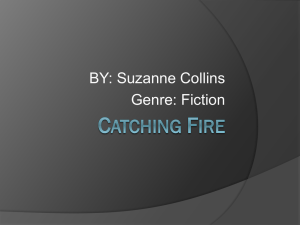SHS Junior Summer Reading List 2012
advertisement
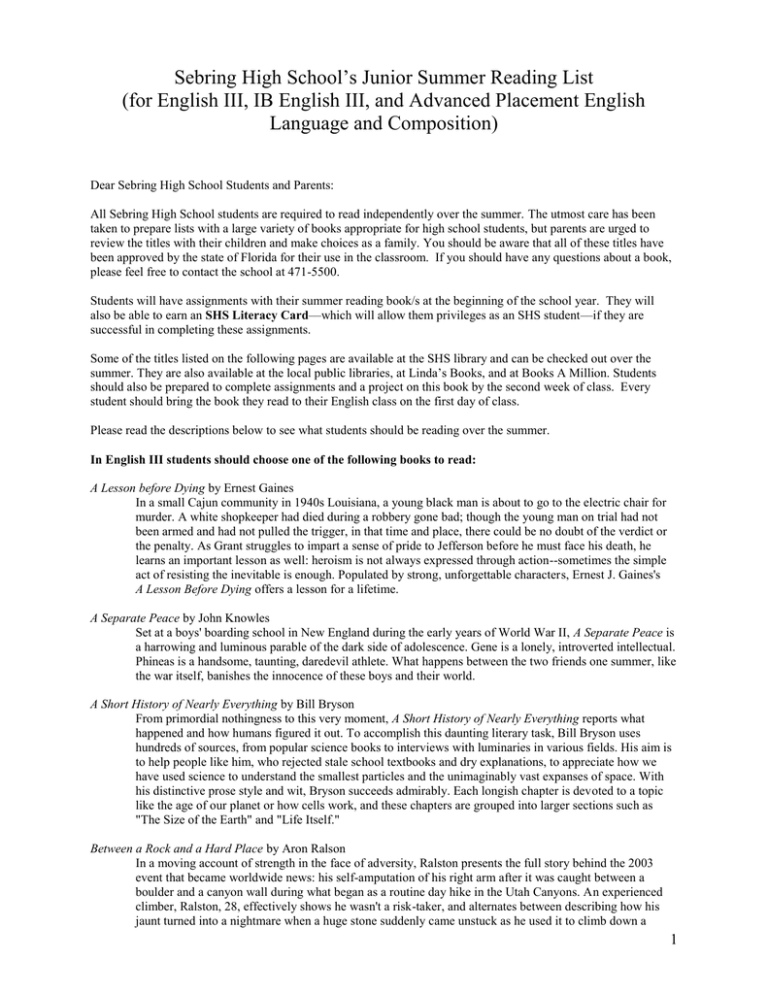
Sebring High School’s Junior Summer Reading List (for English III, IB English III, and Advanced Placement English Language and Composition) Dear Sebring High School Students and Parents: All Sebring High School students are required to read independently over the summer. The utmost care has been taken to prepare lists with a large variety of books appropriate for high school students, but parents are urged to review the titles with their children and make choices as a family. You should be aware that all of these titles have been approved by the state of Florida for their use in the classroom. If you should have any questions about a book, please feel free to contact the school at 471-5500. Students will have assignments with their summer reading book/s at the beginning of the school year. They will also be able to earn an SHS Literacy Card—which will allow them privileges as an SHS student—if they are successful in completing these assignments. Some of the titles listed on the following pages are available at the SHS library and can be checked out over the summer. They are also available at the local public libraries, at Linda’s Books, and at Books A Million. Students should also be prepared to complete assignments and a project on this book by the second week of class. Every student should bring the book they read to their English class on the first day of class. Please read the descriptions below to see what students should be reading over the summer. In English III students should choose one of the following books to read: A Lesson before Dying by Ernest Gaines In a small Cajun community in 1940s Louisiana, a young black man is about to go to the electric chair for murder. A white shopkeeper had died during a robbery gone bad; though the young man on trial had not been armed and had not pulled the trigger, in that time and place, there could be no doubt of the verdict or the penalty. As Grant struggles to impart a sense of pride to Jefferson before he must face his death, he learns an important lesson as well: heroism is not always expressed through action--sometimes the simple act of resisting the inevitable is enough. Populated by strong, unforgettable characters, Ernest J. Gaines's A Lesson Before Dying offers a lesson for a lifetime. A Separate Peace by John Knowles Set at a boys' boarding school in New England during the early years of World War II, A Separate Peace is a harrowing and luminous parable of the dark side of adolescence. Gene is a lonely, introverted intellectual. Phineas is a handsome, taunting, daredevil athlete. What happens between the two friends one summer, like the war itself, banishes the innocence of these boys and their world. A Short History of Nearly Everything by Bill Bryson From primordial nothingness to this very moment, A Short History of Nearly Everything reports what happened and how humans figured it out. To accomplish this daunting literary task, Bill Bryson uses hundreds of sources, from popular science books to interviews with luminaries in various fields. His aim is to help people like him, who rejected stale school textbooks and dry explanations, to appreciate how we have used science to understand the smallest particles and the unimaginably vast expanses of space. With his distinctive prose style and wit, Bryson succeeds admirably. Each longish chapter is devoted to a topic like the age of our planet or how cells work, and these chapters are grouped into larger sections such as "The Size of the Earth" and "Life Itself." Between a Rock and a Hard Place by Aron Ralson In a moving account of strength in the face of adversity, Ralston presents the full story behind the 2003 event that became worldwide news: his self-amputation of his right arm after it was caught between a boulder and a canyon wall during what began as a routine day hike in the Utah Canyons. An experienced climber, Ralston, 28, effectively shows he wasn't a risk-taker, and alternates between describing how his jaunt turned into a nightmare when a huge stone suddenly came unstuck as he used it to climb down a 1 ledge, and recalling early experiences that changed his novice attitudes toward hiking, which he admits "were not intrinsically safe." Ralston candidly renders the details of six days of entrapment, using transcribed monologues from videotapes he made while trapped, including his increasingly exhausted thoughts as well as poignant farewells to his family. But his best writing details his self-amputation and his subsequent march to safety, in which he rappelled one-armed down a hill and then hiked six miles before someone found him. Ralston's prose is never gruesome, nor is it used to shock, even as he describes first breaking his forearm, and then slipping "into some sort of autopilot" as he cuts through muscle fibers to detach the arm. It's truly thrilling when he finishes and is free: "A crystalline moment shatters and the world is a different place." Catching Fire (The Second Book in The Hunger Games Trilogy) by Suzanne Collins Every year in Panem, the dystopic nation that exists where the U.S. used to be, the Capitol holds a televised tournament in which two teen "tributes" from each of the surrounding districts fight a gruesome battle to the death. In The Hunger Games, Katniss Everdeen and Peeta Mellark, the tributes from impoverished District Twelve, thwarted the Gamemakers, forcing them to let both teens survive. In this rabidly anticipated sequel, Katniss, again the narrator, returns home to find herself more the center of attention than ever. The sinister President Snow surprises her with a visit, and Katniss’s fear when Snow meets with her alone is both palpable and justified. Catching Fire is divided into three parts: Katniss and Peeta’s mandatory Victory Tour through the districts, preparations for the 75th Annual Hunger Games, and a truncated version of the Games themselves. Slower paced than its predecessor, this sequel explores the nation of Panem: its power structure, rumors of a secret district, and a spreading rebellion, ignited by Katniss and Peeta’s subversive victory. Katniss also deepens as a character. Though initially bewildered by the attention paid to her, she comes almost to embrace her status as the rebels’ symbolic leader. Though more of the story takes place outside the arena than within, this sequel has enough action to please Hunger Games fans and leaves enough questions tantalizingly unanswered for readers to be desperate for the next installment. Dave Barry Hits below the Beltway: A Vicious and Unprovoked Attack on Our Most Cherished Political Institutions by Dave Barry Sporting red trunks, white and blue boxing gloves and an American flag towel on the cover, pugilistic Pulitzer-winner Barry (Dave Barry Turns 50, etc.) appears ready for all contenders in this satirical, hardhitting political commentary ("Whatever the needs of the public are, the government responds to those needs by getting larger"). Beginning with a study of "Early Human Governments" when homo sapiens "were short, hairy, tree-dwelling creatures that strongly resembled Danny DeVito," the sardonic Miami Herald columnist breezes through the centuries to the U.S.'s birth and then to the present, amending the Constitution en route: "If a citizen is arrested, and that citizen hides his or her face from the news media, then as far as the Constitution is concerned, that citizen is guilty." He tours D.C. sites like the Mall, the Smithsonian (which "will pay you top dollar for your Beanie Babies, Cabbage Patch dolls, Pokemon cards, refrigerator magnets, ceramic cats") and the White House ("To take a tour, simply climb over the fence and hold very still until men come sprinting to assist you"). He aims jaundiced japery at presidential "language problems" and elections ("One of these years we're going to elect a president whose first official act will be to launch nuclear strikes against Iowa and New Hampshire"). Fast Food Nation by Eric Schlosser Schlosser's incisive history of the development of American fast food indicts the industry for some shocking crimes against humanity, including systematically destroying the American diet and landscape, and undermining our values and our economy. The first part of the book details the postwar ascendance of fast food from Southern California, assessing the impact on people in the West in general. The second half looks at the product itself: where it is manufactured (in a handful of enormous factories), what goes into it (chemicals, feces) and who is responsible (monopolistic corporate executives). In harrowing detail, the book explains the process of beef slaughter and confirms almost every urban myth about what in fact "lurks between those sesame seed buns." Given the estimate that the typical American eats three hamburgers and four orders of french fries each week, and one in eight will work for McDonald's in the course of their lives, few are exempt from the insidious impact of fast food. Throughout, Schlosser fires these and a dozen other hair-raising statistical bullets into the heart of the matter. While cataloguing assorted evils with the tenacity and sharp eye of the best investigative journalist, he uncovers a cynical, dismissive attitude to food safety in the fast food industry and widespread circumvention of the government's efforts at regulation enacted after Upton Sinclair's similarly scathing novel exposed the meat-packing industry 100 years ago. By systematically dismantling the industry's various aspects, Schlosser establishes a seminal argument for true wrongs at the core of modern America. 2 Friday Night Lights by H.G. Bissinger Secular religions are fascinating in the devotion and zealousness they breed, and in Texas, high school football has its own rabid hold over the faithful. H.G. Bissinger, a Pulitzer Prize-winning journalist, enters into the spirit of one of its most fervent shrines: Odessa, a city in decline in the desert of West Texas, where the Permian High School Panthers have managed to compile the winningest record in state annals. Indeed, as this breathtaking examination of the town, the team, its coaches, and its young players chronicles, the team, for better and for worse, is the town; the communal health and self-image of the latter is directly linked to the on-field success of the former. The 1988 season, the one Friday Night Lights recounts, was not one of the Panthers' best. The game's effect on the community--and the players--was explosive. Written with great style and passion, Friday Night Lights offers an American snapshot in deep focus; the picture is not always pretty, but the image is hard to forget. In Search of Our Mothers' Gardens: Womanist Prose by Alice Walker In this, her first collection of nonfiction, Alice Walker speaks out as a black woman, writer, mother, and feminist in thirty-six pieces ranging from the personal to the political. Among the contents are essays about other writers, accounts of the civil rights movement of the 1960s and the antinuclear movement of the 1980s, and a vivid memoir of a scarring childhood injury and her daughter’s healing words. Let Me Play: The Story of Title IX: The Law That Changed the Future of Girls in America by Karen Blumenthal A fascinating look at the birth, growth, stagnation, and final emergence of Title IX. While acknowledging the controversy surrounding this law, the author is unwaveringly supportive of its passage and implementation. Interesting and easy-to-follow chapters highlight the process of creating, revising, fighting for, and ultimately passing this legislation that gave girls and women equal access to physical-education classes, gymnasiums, universities, and graduate schools. Human-interest stories personalize the issues, and photographs of congresswomen fighting for equal opportunities for girls, women demonstrating, and the ultimate victory-a woman on the cover of Sports Illustrated-show how challenging, yet ultimately rewarding, the battle has been. Charts depict amazing statistics about the increase in athletic participation by females from 1970 to 2001. Cartoons show the humorous but painfully true attitudes of our culture toward women as they have strived to achieve equality in this country. The book closes with a "Then and Now" section highlighting the changes Title IX has brought about. Lynn M. Messina's Sports in America (H. W. Wilson, 2001) and Victoria Sherrow's Encyclopedia of Women and Sports (ABC-CLIO, 1996) both offer bits of information, but nothing out there comes close to Blumenthal's portrait of the emergence of women athletes in our society. Mockingjay (The Third Book in The Hunger Games Trilogy) by Suzanne Collins Following her subversive second victory in the Games, this one composed of winners from past years, Katniss has been adopted by rebel factions as their symbol for freedom and becomes the rallying point for the districts in a desperate bid to take down the Capitol and remove President Snow from power. But being the Mockingjay comes with a price as Katniss must come to terms with how much of her own humanity and sanity she can willingly sacrifice for the cause, her friends, and her family. Collins is absolutely ruthless in her depictions of war in all its cruelty, violence, and loss, leaving readers, in turn, repulsed, shocked, grieving and, finally, hopeful for the characters they've grown to empathize with and love. Mockingjay is a fitting end of the series that began with The Hunger Games (2008) and Catching Fire (2009) and will have the same lasting resonance as William Golding's Lord of the Flies and Stephen King's The Stand. However, the book is not a stand-alone; readers do need to be familiar with the first two titles in order to appreciate the events and characters in this one. Old School by Tobias Woolf A scholarship boy at a New England prep school grapples with literary ambition and insecurity in this lucid, deceptively sedate novel, set in the early 1960s and narrated by the unnamed protagonist from the vantage point of adulthood. Each year, the school hosts a number of visiting writers, and the boys in the top form are allowed to compete for a private audience by composing a poem or story. The narrator judges the skills of his competitors, avidly exposing his classmates' weaknesses and calculating their potential ("I knew better than to write George off.... He could win.... Bill was a contender"). His own chances are hurt by his inability to be honest with himself and examine his ambivalent feelings about his Jewish roots. After failing to win audiences with Robert Frost and Ayn Rand, he is determined to be chosen by the last and best guest, legendary Ernest Hemingway. The anxiety of influence afflicts all the boys, but in crafting his final literary offering, the narrator discovers inspiration in imitation, finding his voice in someone else's. The novel's candid, retrospective narration ruefully depicts its protagonist's retreat further and further behind his public facade ("I'd been absorbed so far into my performance that nothing else came naturally"). Beneath its staid trappings, this is a sharply ironic novel, in which love of literature is counterbalanced by bitter 3 disappointment (as one character bluntly puts it, "[Writing] just cuts you off and makes you selfish and doesn't really do any good"). Wolff, an acclaimed short story writer (The Night in Question, etc.) and author of the memoir This Boy's Life, here offers a delicate, pointed meditation on the treacherous charms of art. Shift by Jennifer Bradbury Best friends Chris and Win head out on a West Virginia to Washington State bicycle adventure after high school graduation, at the end of which Win disappears. Alternating chapters flash back to details of the trip, then forward to a private investigation instigated by Win's powerful father to uncover why his son told lies to Chris about an uncle in Seattle who doesn't exist, among other things. Little by little, Win's rich, domineering, and neglectful parents come more into focus, and it becomes evident that the teen needed to escape their iron rule. Win's father is sure Chris is keeping his son's whereabouts a secret. When Chris does figure out where his friend is hiding, everything comes together, as Win deflects his controlling father and sets out to make a life of his own. Chris is a well-drawn character, and readers will care about him. Win is naturally a puzzle-angry, and fighting to become himself. The story moves quickly and will easily draw in readers. Though appearing to be a mystery, it is actually a cross-country personal quest, built on vignettes of realistic encounters along the way. Silent Spring by Rachel Carson Released in 1962, this book offered the first shattering look at widespread ecological degradation and touched off an environmental awareness that still exists. Rachel Carson's book focused on the poisons from insecticides, weed killers, and other common products as well as the use of sprays in agriculture, a practice that led to dangerous chemicals to the food source. Carson argued that those chemicals were more dangerous than radiation and that for the first time in history, humans were exposed to chemicals that stayed in their systems from birth to death. Presented with thorough documentation, the book opened more than a few eyes about the dangers of the modern world and stands today as a landmark work. The Autobiography of Malcolm X by Alex Haley Malcolm X's searing memoir belongs on the small shelf of great autobiographies. The reasons are many: the blistering honesty with which he recounts his transformation from a bitter, self-destructive petty criminal into an articulate political activist, the continued relevance of his militant analysis of white racism, and his emphasis on self-respect and self-help for African Americans. And there's the vividness with which he depicts black popular culture--try as he might to criticize those lindy hops at Boston's Roseland dance hall from the perspective of his Muslim faith, he can't help but make them sound pretty wonderful. These are but a few examples. The Autobiography of Malcolm X limns an archetypal journey from ignorance and despair to knowledge and spiritual awakening. When Malcolm tells coauthor Alex Haley, "People don't realize how a man's whole life can be changed by one book," he voices the central belief underpinning every attempt to set down a personal story as an example for others. Although many believe his ethic was directly opposed to Martin Luther King Jr.'s during the civil rights struggle of the '60s, the two were not so different. Malcolm may have displayed a most un-Christian distaste for loving his enemies, but he understood with King that love of God and love of self are the necessary first steps on the road to freedom. The Good Earth by Pearl Buck Though more than sixty years have passed since this remarkable novel won the Pulitzer Prize, it has retained its popularity and become one of the great modern classics. "I can only write what I know, and I know nothing but China, having always lived there," wrote Pearl Buck. In The Good Earth she presents a graphic view of a China when the last emperor reigned and the vast political and social upheavals of the twentieth century were but distant rumblings for the ordinary people. This moving, classic story of the honest farmer Wang Lung and his selfless wife O-lan is must reading for those who would fully appreciate the sweeping changes that have occurred in the lives of the Chinese people during this century. Nobel Prize winner Pearl S. Buck traces the whole cycle of life: its terrors, its passions, its ambitions and rewards. Her brilliant novel -- beloved by millions of readers -- is a universal tale of the destiny of man. The Great Gatsby by F. Scott Fitzgerald In 1922, F. Scott Fitzgerald announced his decision to write "something new--something extraordinary and beautiful and simple + intricately patterned." That extraordinary, beautiful, intricately patterned, and above all, simple novel became The Great Gatsby, arguably Fitzgerald's finest work and certainly the book for which he is best known. A portrait of the Jazz Age in all of its decadence and excess, Gatsby captured the spirit of the author's generation and earned itself a permanent place in American mythology. Self-made, self-invented millionaire Jay Gatsby embodies some of Fitzgerald's--and his country's--most abiding obsessions: money, ambition, greed, and the promise of new beginnings. "Gatsby believed in the green light, the orgiastic future that year by year recedes before us. It eluded us then, but that's no matter-- 4 tomorrow we will run faster, stretch out our arms farther.... And one fine morning--" Gatsby's rise to glory and eventual fall from grace becomes a kind of cautionary tale about the American Dream. The Help by Kathyrn Stockett What perfect timing for this optimistic, uplifting debut novel (and maiden publication of Amy Einhorn's new imprint) set during the nascent civil rights movement in Jackson, Miss., where black women were trusted to raise white children but not to polish the household silver. Eugenia Skeeter Phelan is just home from college in 1962, and, anxious to become a writer, is advised to hone her chops by writing about what disturbs you. The budding social activist begins to collect the stories of the black women on whom the country club sets relies and mistrusts enlisting the help of Aibileen, a maid who's raised 17 children, and Aibileen's best friend Minny, who's found herself unemployed more than a few times after mouthing off to her white employers. The book Skeeter puts together based on their stories is scathing and shocking, bringing pride and hope to the black community, while giving Skeeter the courage to break down her personal boundaries and pursue her dreams. Assured and layered, full of heart and history, this one has bestseller written all over it. The Hunger Games by Suzanne Collins In a not-too-distant future, the United States of America has collapsed, weakened by drought, fire, famine, and war, to be replaced by Panem, a country divided into the Capitol and 12 districts. Each year, two young representatives from each district are selected by lottery to participate in The Hunger Games. Part entertainment, part brutal intimidation of the subjugated districts, the televised games are broadcasted throughout Panem as the 24 participants are forced to eliminate their competitors, literally, with all citizens required to watch. When 16-year-old Katniss’ young sister, Prim, is selected as the mining districts female representative, Katniss volunteers to take her place. She and her male counterpart, Peeta, the son of the town baker who seems to have all the fighting skills of a lump of bread dough, will be pitted against bigger, stronger representatives who have trained for this their whole lives. Collins’ characters are completely realistic and sympathetic as they form alliances and friendships in the face of overwhelming odds; the plot is tense, dramatic, and engrossing. This book will definitely resonate with the generation raised on reality shows like Survivor and American Gladiator. The Right Stuff by Tom Wolfe Tom Wolfe began The Right Stuff at a time when it was unfashionable to contemplate American heroism. It was exactly the anachronistic courage of his subjects that captivated Wolfe. In his foreword, he notes that as late as 1970, almost one in four career Navy pilots died in accidents. "The Right Stuff," he explains, "became a story of why men were willing--willing?--delighted!--to take on such odds in this, an era literary people had long since characterized as the age of the anti-hero." Wolfe tells his story from a limited omniscient perspective, dropping into the lives of his "characters" as each in turn becomes a major player in the space program. After an opening chapter on the terror of being a test pilot's wife, the story cuts back to the late 1940s, when Americans were first attempting to break the sound barrier. Test pilots, we discover, are people who live fast lives with dangerous machines, not all of them airborne. Chuck Yeager was certainly among the fastest, and his determination to push through Mach 1--a feat that some had predicted would cause the destruction of any aircraft--makes him the book's guiding spirit. Yet soon the focus shifts to the seven initial astronauts. Wolfe traces Alan Shepard's suborbital flight and Gus Grissom's embarrassing panic on the high seas (making the controversial claim that Grissom flooded his Liberty capsule by blowing the escape hatch too soon). The author also produces an admiring portrait of John Glenn's apple-pie heroism and selfless dedication. By the time Wolfe concludes with a return to Yeager and his late-career exploits, the narrative's epic proportions and literary merits are secure. Certainly The Right Stuff is the best, the funniest, and the most vivid book ever written about America's manned space program The Things They Carried by Tim O’Brien A finalist for both the 1990 Pulitzer Prize and the National Book Critics Circle Award, The Things They Carried marks a subtle but definitive line of demarcation between Tim O'Brien's earlier works about Vietnam, the memoir If I Die in a Combat Zone and the fictional Going After Cacciato, and this sly, almost hallucinatory book that is neither memoir nor novel nor collection of short stories but rather an artful combination of all three. Vietnam is still O'Brien's theme, but in this book he seems less interested in the war itself than in the myriad different perspectives from which he depicts it. Whereas Going After Cacciato played with reality, The Things They Carried plays with truth. The narrator of most of these stories is "Tim"; yet O'Brien freely admits that many of the events he chronicles in this collection never really happened. He never killed a man as "Tim" does in "The Man I Killed," and unlike Tim in "Ambush," he has no daughter named Kathleen. But just because a thing never happened doesn't make it any less true. In "On the Rainy River," the character Tim O'Brien responds to his draft notice by driving north, to the 5 Canadian border where he spends six days in a deserted lodge in the company of an old man named Elroy while he wrestles with the choice between dodging the draft or going to war. The real Tim O'Brien never drove north, never found himself in a fishing boat 20 yards off the Canadian shore with a decision to make. The real Tim O'Brien quietly boarded the bus to Sioux Falls and was inducted into the United States Army. But the truth of "On the Rainy River" lies not in facts but in the genuineness of the experience it depicts: both Tims went to a war they didn't believe in; both considered themselves cowards for doing so. Every story in The Things They Carried speaks another truth that Tim O'Brien learned in Vietnam; it is this blurred line between truth and reality, fact and fiction, that makes his book unforgettable. The Tipping Point: How Little Things Can Make a Big Difference by Malcolm Gladwell The premise of this facile piece of pop sociology has built-in appeal: little changes can have big effects; when small numbers of people start behaving differently, that behavior can ripple outward until a critical mass or "tipping point" is reached, changing the world. Gladwell's thesis that ideas, products, messages and behaviors "spread just like viruses do" remains a metaphor as he follows the growth of "word-of-mouth epidemics" triggered with the help of three pivotal types. These are Connectors, sociable personalities who bring people together; Mavens, who like to pass along knowledge; and Salesmen, adept at persuading the unenlightened. (Paul Revere, for example, was a Maven and a Connector). Gladwell's applications of his "tipping point" concept to current phenomena--such as the drop in violent crime in New York, the rebirth of Hush Puppies suede shoes as a suburban mall favorite, teenage suicide patterns and the efficiency of small work units--may arouse controversy…While it offers a smorgasbord of intriguing snippets summarizing research on topics such as conversational patterns, infants' crib talk, judging other people's character, cheating habits in schoolchildren, memory sharing among families or couples, and the dehumanizing effects of prisons, this volume betrays its roots as a series of articles for The New Yorker, where Gladwell is a staff writer. In IB English III students should do the following: Students will have several books they will need to read over the summer and assignments that go with these books. Ms. Klobuchar will inform her future IB students of the requirements for these summer assignments. IB students who have questions about the assignment can email their teacher at: klobuchb@highlands.k12.fl.us or visit her website at http://highmail.highlands.k12.fl.us/~klobuchb/. 6 In Advanced Placement English Language and Composition students should read all of the following books: A Walk in the Woods by Bill Bryson Returning to the U.S. after 20 years in England, Iowa native Bryson decided to reconnect with his mother country by hiking the length of the 2100-mile Appalachian Trail. Awed by merely the camping section of his local sporting goods store, he nevertheless plunges into the wilderness and emerges with a consistently comical account of a neophyte woodsman learning hard lessons about self-reliance. Bryson carries himself in an irresistibly bewildered manner, accepting each new calamity with wonder and hilarity. He reviews the characters of the AT (as the trail is called), from a pack of incompetent Boy Scouts to a perpetually lost man named Chicken John. Most amusing is his cranky, crude and inestimable companion, Katz. The uneasy but always entertaining relationship between Bryson and Katz keeps their walk interesting, even during the flat stretches. Bryson completes the trail as planned, and he records the misadventure with insight and elegance. He is a popular author in Britain and his impeccably graceful and witty style deserves a large American audience as well. Narrative of the Life of Frederick Douglas: An American Slave by Frederick Douglass No book except perhaps Uncle Tom’s Cabin had as powerful an impact on the abolitionist movement as Narrative of the Life of Frederick Douglass. But while Stowe wrote about imaginary characters, Douglass’s book is a record of his own remarkable life. Born a slave in 1818 on a plantation in Maryland, Douglass taught himself to read and write. In 1845, seven years after escaping to the North, he published Narrative, the first of three autobiographies. This book calmly but dramatically recounts the horrors and the accomplishments of his early years—the daily, casual brutality of the white masters; his painful efforts to educate himself; his decision to find freedom or die; and his harrowing but successful escape. An astonishing orator and a skillful writer, Douglass became a newspaper editor, a political activist, and an eloquent spokesperson for the civil rights of African Americans. He lived through the Civil War, the end of slavery, and the beginning of segregation. He was celebrated internationally as the leading black intellectual of his day, and his story still resonates in ours. One Child by Torey Hayden One Child is the story of a lost little girl and the extraordinary teacher who works to find her. Sheila has been forgotten by the system, her family, and society itself. She has been shuffled between relatives and institutions before landing in Torey Hayden's secluded annex classroom. Even the school does not pose the potential for a "home", since Sheila is only waiting to be transferred to the state hospital. Over the course of five months, Sheila transforms under Torey's care into a more self-assured and happy child, headed for the second grade instead of the state hospital. Students also need to complete a summer reading packet, which they should have received in their English II or English II Honors class. (Extra packets are also available in guidance.) If students have questions about the assignment, they should visit: http://highmail.highlands.k12.fl.us/~rosenbac/ for additional information. A quiz and assignments on these books will be done the first week of class. The summer reading packet will be due the first day of class. _____________________________________________________________________________________________ Note: Descriptions of these books were found at www.amazon.com. Please visit this website if you would like to read excerpts from the books before you purchase or borrow them. 7
